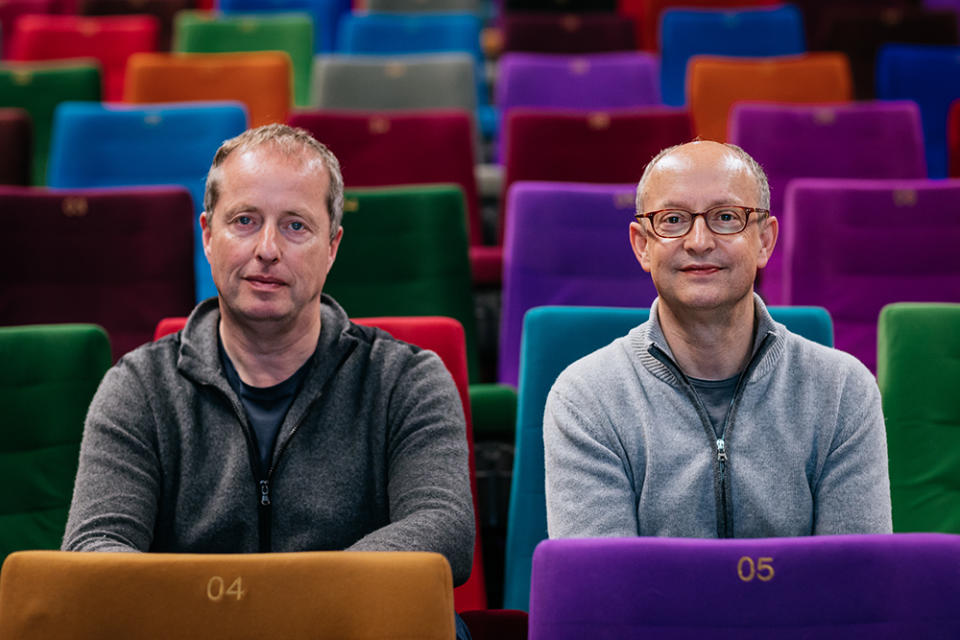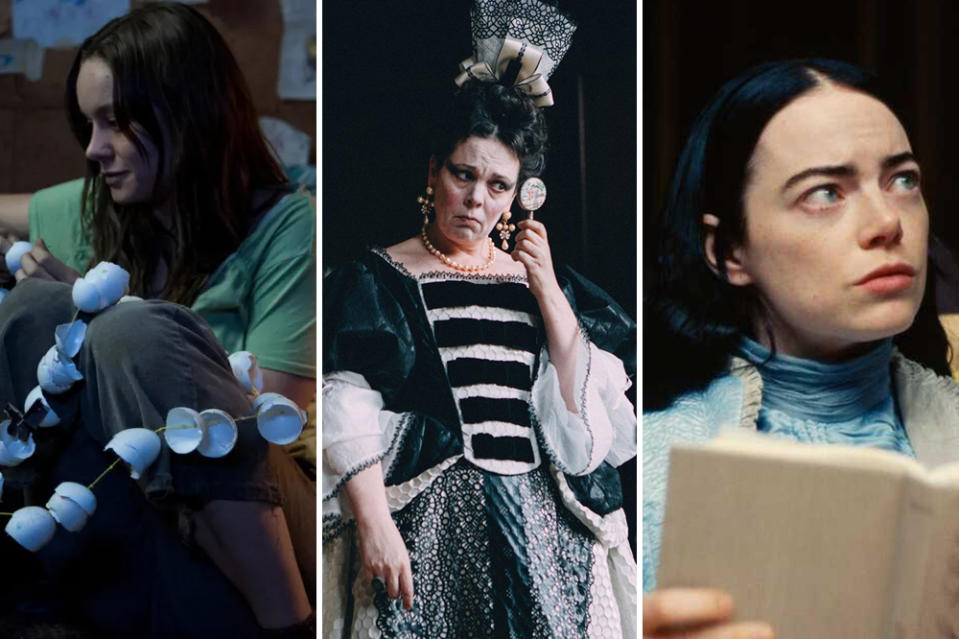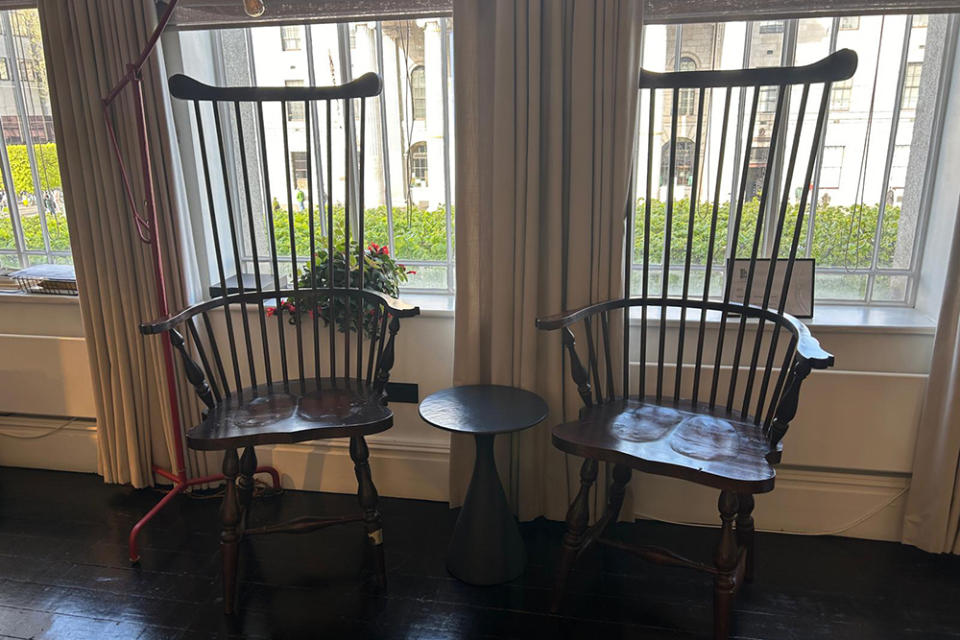Inside Element Pictures: How the Irish Production Company Became a European Powerhouse, Yorgos Lanthimos Whisperer and Cannes Triple Threat
- Oops!Something went wrong.Please try again later.
- Oops!Something went wrong.Please try again later.
- Oops!Something went wrong.Please try again later.
- Oops!Something went wrong.Please try again later.

Getting a feature into Cannes’ official selection is among the pinnacles of filmmaking achievements for most production companies. Ireland’s Element Pictures clearly isn’t most production companies — this year, it has three.
According to co-founder Ed Guiney, who set up Element with Andrew Lowe in 2001, while his company’s triple-headed festival visit may be “wonderful” (and, quite possibly, a U.K./Irish record), it’s simply down to good fortune and timing. “You know, some years you have nothing for Cannes,” he says, speaking from Element’s breezy, white-walled Dublin headquarters, located above an outdoor clothing shop and a jeweler on the Irish capital’s busy O’Connell Street, where it also runs its distribution arm Volta Pictures and the programming for the popular arthouse Light House Cinema, which it has operated since 2012.
More from Variety
But for anyone who has been keeping an eye on Element over the last decade, this edition of Cannes is merely another unprecedented milestone in a trajectory littered in both glory — from Oscars, to BAFTAs, Golden Lions, Palme d’Ors, Emmys and more — and a growing assortment of international filmmaking icons eager to collaborate (including new addition, the Venice-winning Audrey Diwan, now attached to direct “The Marriage Portrait” for them).
This edition of Cannes also offers a symbolic snapshot of Element’s filmmaking output.
“Kinds of Kindness,” competing for the Palme d’Or, marks the company’s fifth feature with the director who has given them perhaps the greatest taste of international acclaim, Yorgos Lanthimos. The film, coming hot on the gothic heels of the multi-award winning “Poor Things” (and again with Searchlight and starring Emma Stone and Willem Dafoe), is “a Greek tragedy set in modern-day America,” according to Lowe, who likens it to Lanthimos’ earlier work pre-“The Favourite.”

Lanthimos, it should also be noted, has contributed more than any other director to helping furnish Element’s office, which boasts two impressively high-backed Windsor chairs, a weird reptilian coat stand and an oil painting of Dafoe, all swiped from the set of “Poor Things” (as for the film’s grand piano, which Stone’s character Bella Baxter plays with her feet, Lowe took that home).
“On becoming a Guinea Fowl,” meanwhile, is the long-awaited sophomore film from Rungano Nyoni, who caused a major stir with her uniquely spun 2017 feature debut “I am Not a Witch.” Eager to work with the rising director, Guiney says they “chased her down and kept in touch,” and were then able to get involved in her next project, another dark comedy set in rural Zambia, as co-producers alongside BBC Film and A24.
And then “September Says” — exploring the relationship between two teenage siblings and based on the novel “Sisters” by Daisy Johnson — is the directorial debut from French actor Ariane Labed, who, in a nice round circle, starred in Lanthimos’ “Alps” and “The Lobster” (Element’s first adventure with the director). Both “Guinea Fowl” and “September Says” will premier in Cannes’ Un Certain Regard competition.
As Guiney notes, the combination of another wild ride with an iconic auteur, the eagerly anticipated second outing from an exciting original cinematic voice and the first feature from an emerging filmmaker is “quite emblematic of what we do.”
Also emblematic of Element is the relationships it builds — and maintains — with its directors. There’s a reason Lanthimos — who they initially met after “Dogtooth,” attaching him to direct a project they were developing that would, eventually, become “The Favourite” — keeps coming back for more (and he already has another in the pipeline with the remake of South Korean fantasy comedy “Save the Green Planet,” shooting this summer).
“But it’s not something we’d ever take for granted,” Guiney insists. “We have to prove ourselves to be useful to him every time.” Brit master filmmaker Joanna Hogg is another, having worked with Element on both “The Eternal Daughter” and “The Souvenir Part II.” Nyoni, Labed and, now, Diwan will likely join this growing creative pool.

“As a company, we sort of don’t have a USP,” Guiney says. “And what I mean by that is we can bend ourselves around any individual filmmaker we’re working with. We don’t have an Element way that must be followed. So if they feel empowered and can do good work in that environment, hopefully they will come back.”
And then there’s Lenny Abrahamson, who made short films with Guiney back when they were both studying at Dublin’s Trinity College in the late 1980s and has been responsible for some of Element’s most seismic achievements.
Abrahamson’s 2004 feature debut, the buddy comedy “Adam & Paul,” gave the company its first taste of shiny gongs, landing eight nominations at the Irish Academy Awards. With 2015’s “Room,” he took them to the Oscars, where Brie Larson won best actress, Element’s first of three (and also the first Academy Award for a then-youthful A24, the start of a blossoming relationship between the two outfits).
“That was a very important moment for us when it came to increasing our visibility,” Guiney notes. And while Element had already been making TV for several years, Abrahamson’s adaptation of Sally Rooney’s “Normal People” was a hit like little else, an early pandemic-fueled small-screen eruption that gave birth to two full-fledged Hollywood stars in Paul Mescal and Daisy Edgar-Jones. Little wonder the director, essentially an unofficial employee of Element, has his own office (one Lowe notes “has the best view,” looking out across the road to the grand former General Post Office, a site that became the epicenter of the 1916 Easter Uprising).
It’s clear Element — which now has a staff of 42 spread across Dublin, Belfast and London — needs little more exposure. But it’s still going through a gear shift, this time courtesy of European TV behemoth Fremantle, which in 2022 bought a majority stake in the company.
Having been entirely independent previously, Lowe says they’d been looking for someone “to pair up with” for several years to help provide the financial cushion for its expansion plans. With Fremantle — whose TV heritage dates back to the 1950s — they found a partner “totally agnostic” when it comes to films, allowing Element to keep working with the Searchlights and the A24s and whoever they wanted, without an editorial mandate. But Fremantle, despite its small screen roots, has also shown a “growing appetite” for cinema, having recently inked talent deals with the likes of Luca Guadagnino, Paolo Sorrentino, Pablo Larrain, Ed Berger, Rachel Weiss and Johan Renck or their various production companies.
“And these are actually the kind of people that we gravitate towards,” notes Guiney, adding that there are “very few bigger companies that we could have ended up with who really work so enthusiastically across film.”

There’s no doubt Fremantle is absolutely delighted with the prestigious spoils from its new Irish acquisition (to celebrate the awards success of “Poor Things,” it sent out large packs of pasteis de nate — the Portuguese custard tarts Bella consumes whole with enthusiastic gusto — to journalists). But Fremantle is now directly financing Element features — “organically, when it fits for both them and us,” notes Lowe — and there are co-productions planned with other entities under the Fremantle umbrella. Indeed, Diwan’s “The Marriage Portrait,” based on the novel by Maggie O’Farrell, marks the first co-production between Element and Fremantle’s illustrious Italian banner Wildside (“The Young Pope”).
“In a way, what Fremantle allows us to do is look into the future to continue to do what we’ve been doing and expand that,” Guiney says.
With this new financial backing, Element hopes to be completing two-to-three features and two-to-three TV series each year, but there’s no specific quota and it’s very clear the company has reached a point where it only makes what it wants.
Thankfully, what it wants to make appears to be what audiences want to watch, and Element’s meteoric rise to the top has coincided with a renewed demand for the sort of daring, thought-provoking, provocative and unexpected films it produces.
“Cinema is back, at some level at least,” says Guiney, showing a photo of the entrance to Element’s Lighthouse Cinema plastered with hand drawn signs indicating which screenings had sold out.
“People are coming out to see stuff that is original, is filmmaker-driven and is a big filmmaker statement,: he says. “And that’s absolutely the business we are in and want to continue to be in and to grow the relationships we have within that. So it feels very exciting.”
Best of Variety
Sign up for Variety’s Newsletter. For the latest news, follow us on Facebook, Twitter, and Instagram.

